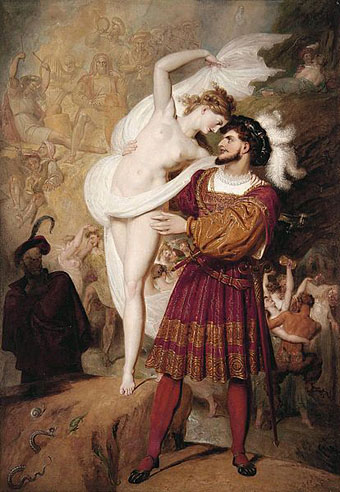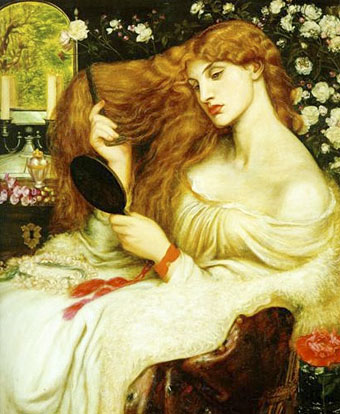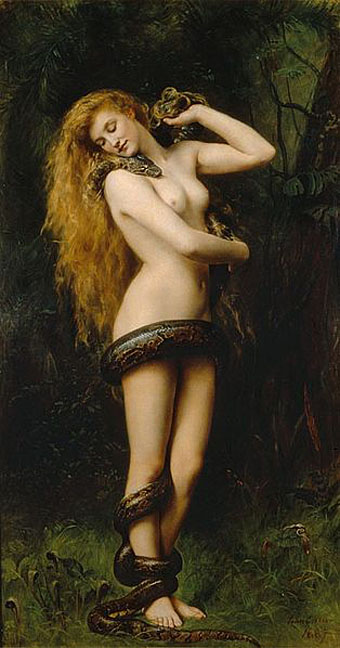
Faust and Lilith (1831) by Richard Westall.
Lilith: less the Babylonian demon and more the temptress, succubus and “first wife of Adam”.

Lady Lilith (1868) by Dante Gabriel Rossetti.

Lilith (1889) by John Collier.
A journal by artist and designer John Coulthart.

Faust and Lilith (1831) by Richard Westall.
Lilith: less the Babylonian demon and more the temptress, succubus and “first wife of Adam”.

Lady Lilith (1868) by Dante Gabriel Rossetti.

Lilith (1889) by John Collier.
MMOB :: Far West (2013) by Alison Scarpulla.
• “…although same-sex love is as old as love itself, the public discourse around it, and the political movement to win rights for it, arose in Germany in the late nineteenth and early twentieth centuries. This message may surprise those who believe that gay identity came of age in London and New York, sometime between the Oscar Wilde trials and the Stonewall riots.” Alex Ross reviewing Robert Beachy’s Gay Berlin: Birthplace of a Modern Identity. Beachy talks about his book here.
• “I was in a room with tube synthesizers, where you had to tune them up to play them. It was unbelievable.” John Carpenter talking to Joseph Stannard about composing with electronics. Carpenter’s album of new music, Lost Themes, may be previewed here.
• From 2010: John Ridpath on Mervyn Peake’s illustrations for Lewis Carroll’s Alice Through the Looking Glass and Alice in Wonderland. Related: “The most twisted version of Alice in Wonderland you’ll ever see.”
I was brought up in a world where art was something owned and insured—usually inherited: but seldom if ever made by anyone one I knew.
I had an early inkling that there was fun to be had over the hill, like the feeling when faced with a sunset that someone’s throwing a mega awesome party just beyond the nearest cloud, and I set off to join the caravan. Let’s just say I was in search of company, headed towards the glow, and I found it.
Tilda Swinton‘s speech at the Rothko Chapel
• “Her art often touches on alchemy and magic; and in her memoir of insanity she writes of misreading an Imperial Chemicals sign as ‘chemistry and alchemy’.” Charlotte Higgins on Leonora Carrington.
• Shadows Over Main Street, an anthology of small-town Lovecraftian terror, is out this week from Hazardous Press. 20 stories and poems plus interior illustrations including a contribution of my own.
• “With Fantastic Planet, I felt torn about using it, because it’s…the title of an animated film.” Guitarist Sarah Lipstate, aka Noveller, talks to Ned Raggett about her new album.
• Jim Jupp of Belbury Poly and the Ghost Box record label answers 15 questions.
• A DeLorean driving through a Tron cityscape: Retrowave by Florian Renner.
• Powell & Pressburger’s Tales of Hoffmann (1951) has been restored.
• Music from Forbidden Planet (1956) by Louis & Bebe Barron | The Four Horsemen (1972) by Aphrodite’s Child | Assault on Precinct 13 (Main Theme) (1976) by John Carpenter
Non-Brits may not be aware that The South Bank Show is a long-running arts programme (or “show”, as Americans prefer) and the last bastion of cultural broadcasting on the otherwise completely moribund ITV channel. Over the years the SBS has produced some great documentaries and this one from 1985 is particularly good, capturing artist Francis Bacon in fine form, both as combative critic and sozzled pisshead when he and presenter Melvyn Bragg drink too much wine in a restaurant. Highlights include his funny dismissal of Mark Rothko whilst viewing paintings at the Tate, their tour of his cramped studio, and his drunken pronunciation of the word “voluptuous” when describing Michelangelo’s male figures.
I taped this programme when it was repeated after Bacon’s death in 1992 but you lucky people can now see and download it from Ubuweb. (Their note says the SBS is a BBC production but this is incorrect.)
Part of The South Bank Show series, David Hinton directs this documentary about British painter Francis Bacon, known for his horrifying portraits of humanity. The program consists of a series of conversations between Bacon and interviewer Melvyn Bragg, starting with commentary during a side-show presentation at the Tate Gallery in London. Later in the evening, Bacon is followed through various bars hanging out, drinking, and gambling. In another segment, Bacon provides a tour of his painting studio and a glimpse at his reference photographs of distorted humans. The artist discusses his theories, influences, and obsessions. This title won an International Emmy Award in 1985.
This isn’t necessarily the best Bacon interview, that accolade would probably have to go to the 1984 Arena documentary (which was a BBC production) Francis Bacon: The Brutality of Fact where FB is interviewed by art critic and long-time supporter David Sylvester. Sylvester interviewed Bacon many times over twenty years or so and Thames & Hudson printed the Arena interview along with several of their other talks in Sylvester’s book of the same name. Essential reading for anyone interested in the artist’s work.
Bacon’s work has affected my own on a number of occasions. The cover to Reverbstorm #4 borrowed the carcass from his Painting (1946); some of the paintings I was doing in 1997 (like this one and this one) are distinctly Bacon-esque and we used two of his paintings on the cover design for Savoy’s edition of The Killer (Dave Britton’s idea on that occasion).
His work remains popular for the over-inflated art market. Sketches and unfinished paintings that he was throwing out, and detritus like discarded cheque books, sold for nearly a million pounds last month. And earlier this week his Study from Innocent X (1960) went for $52.6m in a New York auction. Bacon once said that “some artists leave remarkable things which, a hundred years later, don’t work at all. I have left my mark; my work is hung in museums, but maybe one day the Tate Gallery or the other museums will banish me to the cellar—you never know.” I think we can assume this won’t be happening for a while yet.
Elsewhere on { feuilleton }
• The gay artists archive
Previously on { feuilleton }
• T&H: At the Sign of the Dolphin
• 20 Sites n Years by Tom Phillips